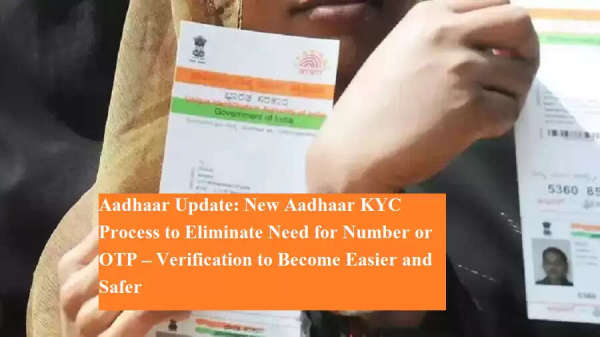
In a move aimed at enhancing user privacy and simplifying identity verification, the Unique Identification Authority of India (UIDAI) is preparing to roll out a new offline Aadhaar KYC process that will not require users to share their Aadhaar number or even a one-time password (OTP). This major update is being developed with a focus on security, convenience, and broader accessibility—particularly for financial service providers.
Aadhaar has become a central document for identity verification in India, especially across banking, telecom, and government services. However, its widespread use has also raised concerns regarding data misuse and privacy breaches. To counter this, UIDAI is designing a more secure offline verification system that ensures user data remains protected while making the Know Your Customer (KYC) process faster and easier.
According to two senior banking officials who spoke to The Economic Times, the upcoming system will allow users to complete Aadhaar-based KYC without revealing sensitive information such as their Aadhaar number or any personal details. This change is expected to help financial institutions and other service providers conduct secure identity checks without directly accessing the Aadhaar database.
At present, KYC processes—whether electronic, biometric, or offline—require individuals to share their Aadhaar number or undergo in-person verification. The new model, however, will remove these requirements. Instead, UIDAI aims to introduce a fully offline process that functions with the user's consent and without needing biometrics or OTPs.
The proposed system will also integrate features like QR codes and PDF documents, which users can download from the UIDAI website. These documents will serve as secure, encrypted alternatives to traditional verification methods, making it easier for users to manage and complete their KYC.
This revamp is especially significant for fintech firms and non-banking financial companies (NBFCs), many of which faced operational disruptions in June. Several startup platforms were blocked from accessing Aadhaar data after allegations of unauthorized use. In response, the Ministry of Electronics and Information Technology (MeitY) and UIDAI began tightening Aadhaar data regulations.
To restore trust and compliance, UIDAI is working closely with Aadhaar Authentication Agencies and KYC User Agencies to develop a consent-driven, transparent KYC model. The new approach is expected to reduce the risk of data misuse while increasing the adoption of Aadhaar-based services among regulated financial entities.
No Aadhaar Number Required: Users will no longer need to share their Aadhaar number for identity verification.
OTP and Biometric-Free: KYC can now be completed without biometric scans or OTP-based authentication.
QR Code & PDF Format: UIDAI will promote secure QR codes and downloadable PDF files as standard tools for offline verification.
User Consent First: Verification will only proceed with the full consent of the individual.
Data Privacy Ensured: Sensitive data remains offline and secure, minimizing privacy risks.
Relief for Fintech Sector: This shift will benefit startups and NBFCs previously impacted by access restrictions.
UIDAI’s offline KYC overhaul is still in development, but once implemented, it is expected to significantly streamline identity verification across sectors. For end-users, this means enhanced privacy and less hassle. For businesses, especially in fintech and lending, it offers a compliant, cost-effective alternative to existing KYC norms.
By removing the need for sensitive data sharing, the UIDAI aims to build a more secure, user-friendly Aadhaar ecosystem—one that empowers users while safeguarding their privacy.